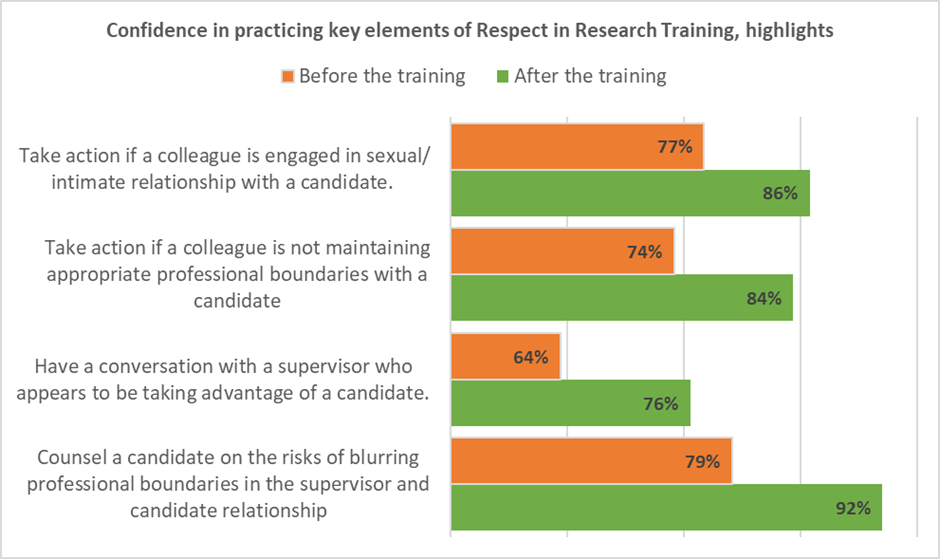The Respectful Research Training Program at RMIT University is an enterprise-wide program that promotes a safe, respectful graduate research training environment. It also aims to prevent sexual assault, sexual harassment and related problems.
To the best of our knowledge, this is the first time any Australian university has adopted a culture-change initiative of this kind focused on research training.
How did Respectful Research Training come about?
In 2017, the Australian Human Rights Commission published Change the Course, a report on sexual assault and sexual harassment in Australian universities. The report called out the unacceptable forms of gendered and coercive conduct (such as sexual assault and sexual harassment) that postgraduate students face at the hands of academic staff – issues also observed in other international studies.
The Australian Council of Graduate Research (ACGR) responded to these findings by creating instructional materials to promote respect in higher degree by research programs.
The ACGR resource comprises:
- six videos of realistic scenarios that highlight the challenges in maintaining professional boundaries for higher degree by research candidates and their supervisors; and
- an instruction manual to support the professional development of all graduate research stakeholders.
This resource is available for ACGR member universities to use and forms the basis of RMIT’s program.


Instead of framing the resource explicitly or solely around the issue of sexual assault and sexual harassment, such harms are addressed obliquely, via the rubric of respect.
By adopting the rubric of respect, the resource aligns with comparable undergraduate initiatives focused on respectful relationships and consent, such as Universities Australia’s Respect. Now. Always campaign and their co-developed Principles for Respectful Supervisory Relationships.
Respect-based terminology has since become widely adopted by Australian universities in their measures to prevent and raise awareness around sexual assault and sexual harassment.
It begins with executive buy-in
RMIT committed to adopting the ACGR training resources, including the adaptation of the materials to the institutional context and the rollout of training, in late 2019. Importantly, this was endorsed by the senior executive, including the then Vice-Chancellor, who supported mandating this training for all supervisors.
It was also adopted as an action item of the Vice-Chancellor’s Advisory Committee, established in response to Change the Course. This strong executive support helped secure additional resourcing. Furthermore, it allowed the program to be framed as part of the university’s broader response to Change the Course and leverage existing campaigns under the banner of Respect.
Adapting the program for RMIT
Initial development and delivery of the program was a collaboration between the School of Graduate Research and Organisational Development. The program co-leads worked together to tailor the learning materials to the RMIT context.
The program design aims to develop broad, foundational knowledge. Participants start by completing a self-directed e-module (40 minutes) and then progress to deeper learning through a facilitated collegiate discussion (2 hours). The discussion is conducted as a webinar and participants often come from different schools.
Consistent with the respect rubric, the content addresses a wide range of disrespectful conduct and workplace harms. It focuses on three key risk factors:
- the inherent power imbalance within the supervisor(s)–candidate relationship;
- the ambiguity that arises when boundaries are not clearly defined; and
- the hybrid identities of research candidates who are both students and researchers in training, often functioning like colleagues.
Although the ACGR materials make up the core elements of RMIT’s program, more learning design and content were needed to make it relevant to our institution. We did this by scaffolding the video scenarios with ‘before’ and ‘after’ contextual information about relevant RMIT policies and services. Adding these details is crucial because it provides:
- clarity regarding relevant policy settings, such as staff–student relationships and conflict of interest, and the responsibilities of all parties; and
- necessary information about services that are available for support, such as where to go for help, advice or to make a report or disclosure.
The customisation and program development process also helped us identify gaps in existing institutional resources. For example, we created a detailed interactive tool to assist candidates and supervisors with setting expectations and boundaries.
The program was delivered in two stages (Table 1). We started with higher degree by research supervisors and will extend it to candidates once the first phase reaches saturation. To date, all existing supervisors have completed the program – around 1400 academics in total. The candidate-facing program has undergone user testing and is now required for all candidates commencing from 2023.
Table 1. Overview of the implementation of RMIT’s Respectful Research Training Program.
| 2020 to 2022 | 2023 and beyond | ||
|---|---|---|---|
| Cohort | Program components | Completion rate | Requirement |
| Higher Degree by Research supervisors |
|
1400+ academics (95% of supervisor population) | Compulsory for all supervisors |
| Higher Degree by Research candidates |
|
In user testing phase |
|
Measuring and reflecting on the program’s success
The longevity and uptake of the program were greatly helped by the fact that it:
- was integrated with requirements for supervisor registration and candidate enrolment;
- received cross-institutional buy-in and support;
- had executive endorsement; and
- aligned well with existing institutional initiatives, such as Respect. Now. Always and Athena Swan.
To what extent has the Respectful Research Training program initiative achieved its aims of promoting a mutually respectful and safe research training environment? We use two evaluation mechanisms: post-seminar supervisor evaluations and a comprehensive participant evaluation.
Post-seminar supervisor evaluation
Completed by 250 participants to date, results suggest high levels of satisfaction with the program, scoring a mean response of 4.5 out of 5.
Comprehensive participant evaluation
We surveyed supervisors to measure their pre-and post-training levels of understanding and confidence in using key concepts. The survey was complemented by select interviews. The results showed improvement on every item tested across two broad scales: enhanced knowledge and understanding of key concepts, and confidence in putting into practice their learnings from the program. The standout area of improvement is in the latter – most participants report feeling confident and very confident about practising key elements of respectful research training (Figure 1).

While the results are promising, it’s too soon to know whether the desired cultural change will be fully realised in terms of measurable outcomes and impact.
Respectful Research Training will form a cornerstone of our future Cygnet application on Respectful Cultures and Behaviours.”
Professor Kay Latham, RMIT Dean of STEMM Diversity and Inclusion
Conclusion
Our view is that, on balance, respect-based programs can be useful for awareness-raising and increasing people’s confidence in dealing with critical situations.
This assessment comes with important caveats. The inherent limitations of these approaches need to be recognised; namely, that by masking the gendered basis of power in higher education, they do little to address the underlying causes of gender-based violence.
If you’re delivering similar programs, you need to anticipate the need for mitigation strategies in both program design and delivery. We discuss these in more detail, as well as the broader theoretical and practical merits and drawbacks of the program, in our paper.



